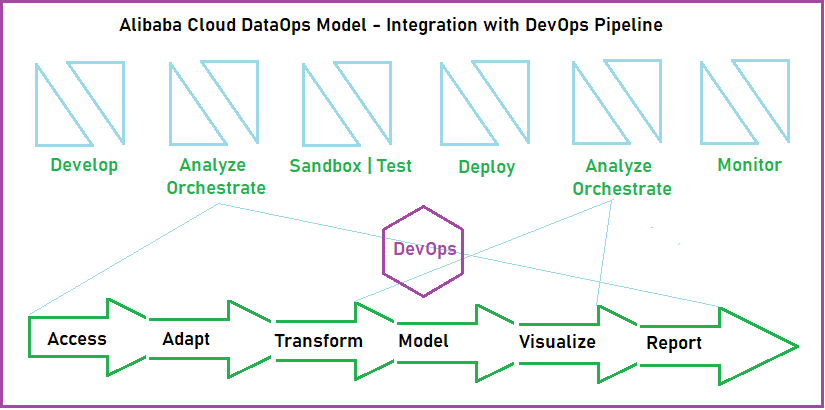By Shantanu Kaushik
DataOps is an approach to data analytics that combines storage and access to allow data engineers to adapt and leverage the benefits based on the same principles that the DevOps pipeline utilizes. As a developer, tester, or administrator, you have worked with DevOps. However, as a data analyst, you may feel left out of the DevOps revolution. Well, that is changing.
When you combine the functionality and principles associated with DevOps and Data Analytics, you get DataOps. DataOps is an extension of DevOps practices combined with Data Analytics. DevOps is all about seamless collaboration between the Developer Team, QA, and Operation Teams. DataOps follows the same principles of collaboration between IT administrators and data engineers.
Let’s take a look at the architectural pattern-based visualization of DataOps:

DataOps streamlines the complete process flow that starts with storing data, analyzing it, and extracting its value. Alibaba Cloud Big Data solution is an excellent example. DataOps aims to integrate value that an evolving DevOps might lack. They are based on Agile. DataOps is an extension to DevOps that breaks down any silos that separate different teams when it comes to data analytics and engineering.
| DevOps | DataOps |
| Focused on Development to Delivery | Focused on Data Analytics and Storage |
| Works on Collaboration | Works on Collaboration |
| Software Engineering | Data Engineering |
| Code Reviews, Continuous Delivery, Continuous Integration | Data Science, Analytics, and Business Intelligence |
| Testing Automation | Data Governance |
| Monitoring for Metrics Collection and QA | Monitoring for Process Control, Value Delivery, and QA |
| Integration, Delivery, and Feedback | Experimentation, Feedback, and Iterations |
| Resource-Based Ownership | Cross-Functional Ownership of Operations |
DevOps is known for its integration and delivery cycles. This continuous integration and delivery has accelerated the software development lifecycle considerably and removed clogs in the chain. Development and operations teams coming together revolutionized the whole process.
DataOps further adds and builds to the concepts of DevOps. It adds another layer where data engineers or specialists can work with data analysis. Data scientists, developers, and analysts can collaborate to understand data flow to extract more value from a deployment scenario.
DataOps works on feedback and quick implementation to satisfy customer demands in an application or functionality.
DevOps collects feedback and other metrics to achieve fault-free and accelerated release cycles, while DataOps works to add better functionality to the release using data analytics.
While implementing a DevOps pipeline, infrastructure requires some hauling. To bring about the Agile development methodology, you need to implement using microservices and containers.
Similarly, DataOps requires up-to-date data analytics and big data solutions. The integration of collection practices based on Machine Learning for AI is another step forward when it comes to orchestrating infrastructure resources for a better workflow. DataOps works well with microservices architecture and is a worthy addition to any DevOps practice that implements microservices.
Data Engineers should be able to leverage the latest tech if they are expected to churn out a state-of-the-art solution. Highly-available and scalable data solutions are required for DataOps to extract value out of a DataOps practice.
DataOps infrastructure has to accommodate large-scale and diverse workloads. To achieve that, the infrastructure should also be able to support it. Data Analytics and the storage solution have to be highly in-sync with resource demand. Along with that, a Business Intelligence solution like QuickBI can add to the overall value of a DataOps pipeline.
To extract the most out of it, enterprises and organizations have to evolve their data management, analytics, and processing infrastructure. Only then can they implement DataOps with the correct strategies and scalability to deal with real-world scenarios.
DataOps can leverage machine learning as a new upgraded way of applying data science to operations. Development and delivery models can benefit from AI-based learning models. DataOps can provide this solution to help the complete system evolve.
DataOps is on the right track to build a global fabric for services and solutions to collaborate on a level like never before. It pitches and creates a pipeline that is not limited to one specific technology. It starts with machine learning and can implement different data-manipulation techniques to extract more value from a solution.
An organization that has already made the shift to DevOps already has the means to adopt DataOps. They share the same DNA that could be expanded to adopt and extend to a DataOps practice. An effective DataOps pipeline can benefit from defining cross-tier teams. Data scientists can be plugged into a team of DevOps engineers, and developers could learn data analysis skills.
Building a team is about aligning perspectives for the task at hand. A team of individuals defined to take on multiple roles will result in a healthy DataOps practice.
When it comes to large-scale practices, DataOps can scale up and collaborate using multiple teams to work with the same thread that aligns perspective.
Some of the roles that make up DataOps Teams are listed below:
Some of the focus areas of DataOps Teams may include individuals from:
Better communication and collaboration between different teams allow for faster results and better time-to-value. DataOps is a way to optimize your data analytics and storage workflows the same way DevOps does for application development.
DataOps is a new trend in terms of technology years. DevOps is a young practice that has unlimited potential for growth and evolution. DataOps seems to be the key to a rapid and accelerated growth of DevOps. It is a type of growth that opens up numerous new pathways to be explored and offers research and development potential for new tools and cross-system-wide update for tools to integrate data science into the existing architecture.
DevOps Trends to Watch for in 2021

2,593 posts | 793 followers
FollowAlibaba Clouder - December 25, 2020
Alibaba Clouder - January 4, 2021
Alibaba Clouder - December 31, 2020
Alibaba Clouder - December 28, 2020
Alibaba Clouder - March 1, 2021
Alibaba Clouder - March 24, 2021

2,593 posts | 793 followers
Follow Microservices Engine (MSE)
Microservices Engine (MSE)
MSE provides a fully managed registration and configuration center, and gateway and microservices governance capabilities.
Learn More DevOps Solution
DevOps Solution
Accelerate software development and delivery by integrating DevOps with the cloud
Learn More Alibaba Cloud Flow
Alibaba Cloud Flow
An enterprise-level continuous delivery tool.
Learn More Container Service for Kubernetes
Container Service for Kubernetes
Alibaba Cloud Container Service for Kubernetes is a fully managed cloud container management service that supports native Kubernetes and integrates with other Alibaba Cloud products.
Learn MoreMore Posts by Alibaba Clouder